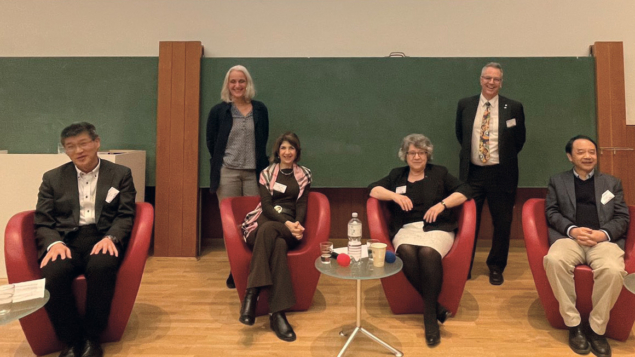
The International Committee for Future Accelerators (ICFA) was formally founded in 1977 as a working group in IUPAP’s commission 11 (C11, Particles and Fields). Today it remains the place for discussions on all aspects of particle physics, in particular on the large accelerators that are at the heart of the field, and on the strategic deliberations in the various regions of the world. Although ICFA has no means of ensuring that any of its resolutions are carried out, it can act as the “conscience” of the field, and its recommendations can also influence national or regional activities. Among the currently 16 members, which include directors of CERN, Fermilab, IHEP, KEK and DESY, three are from Europe, three from the US, two from Russia, two from Japan, and one each from China and Canada. Three further members collectively represent smaller countries and regions, and the functions of chair and secretary rotate through the Americas, Europe and Asia, usually every three years.
A significant fraction of ICFA’s work is carried out within a set of seven panels, which meet regularly and assemble expertise on more technical or detailed aspects of particular importance to the field. One is devoted to the International Linear Collider (ILC). For more than two decades, ICFA has promoted the realisation of the ILC, for which a global design effort was put in place in 2005. In parallel, an international collaboration under CERN’s leadership had been working on the Compact Linear Collider (CLIC). Recognising the synergies between the two concepts, ICFA established a single coordinating structure, the Linear Collider Collaboration (LCC), in 2012. Also that year, the Japanese high-energy physics community proposed to host the ILC in Japan as a global project.
The LCC mandate came to an end in 2020, when ICFA put in place the ILC International Development Team (IDT) and its working groups. In June 2021 the IDT developed a proposal for the “preparatory laboratory” as a first step towards the realisation of the ILC in Japan.
Evolving landscape
While the IDT is continuing its work, the global Higgs-factory landscape has evolved since the early days of the ILC: more – linear and circular – studies and proposals are on the table, not least as demonstrated by the P5 report in the US. ICFA will soon discuss in what way its discussions and structures need to be adapted to better reflect this evolving landscape.
In November 2023 ICFA established a new panel devoted to the “data lifecycle”, which involves everything from data acquisition, processing, distribution, storage, access, analysis, simulation and preservation, to management, software, workflows, computing and networking. The panel, which replaces two previous ones on related topics, was created in response to the growing importance of data management and open science in recent years. Its membership is currently being put together with the aim to develop ideas and strategies for workforce development and professional recognition mechanisms.
For more than two decades, ICFA has promoted the realisation of the ILC
ICFA’s farthest-reaching and most visible activity is the ICFA Seminar. The 13th ICFA seminar on “Future Perspectives in High-Energy Physics” took place at DESY from 28 November to 1 December 2023. For the first time in six years (the prior ICFA seminar had taken place in 2017 in Ottawa, Canada), this select crowd of scientists, lab directors and funding agency representatives could come together in person for updates and discussions. One highlight was the panel discussion between the directors of KEK, CERN, Fermilab and IHEP, in which views on a future global strategy were discussed. The seminar concluded on a festive note with the formal passing of the ICFA chair baton from Stuart Henderson (JLAB) to Pierluigi Campana (INFN), who will lead ICFA for the next three years.
ICFA is the only global representation of the particle-physics community, and the ideal discussion forum for global strategic developments, especially large international collider projects. In view of the current situation with numerous opportunities for future facilities – not least a future Higgs factory, but also smaller and more diverse projects – the committee and its panels look forward to serving the field of particle physics through continued advocacy, exploration, discussion and facilitation.








